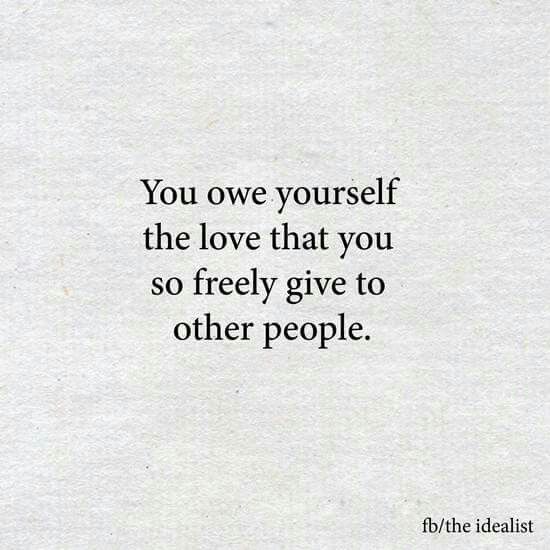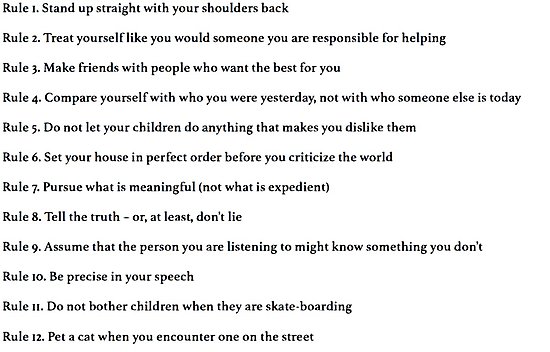
12 Rules For Life is a stern, story-based, entertaining self-help manual, that gives a set of simple principles, helping us to take responsibility to become more disciplined, behave better, act with integrity, and balance our lives while enjoying them as much as we can.R
My favourite quote by Professor Peterson is:

The 12 rules of Professor Petersons book are:
Rule 1 Stand up straight with your shoulders back
Rule 2 Treat yourself like you would someone you are responsible for helping
Rule 3 Make friends with people who want the best for you
Rule 4 Compare yourself with who you were yesterday, not with who someone else is today
Rule 5 Do not let your children do anything that makes you dislike them
Rule 6 Set your house in perfect order before you criticise the world
Rule 7 Pursue what is meaningful (not what is expedient)
Rule 8 Tell the truth – or, at least, don’t lie
Rule 9 Assume that the person you are listening to might know something you don’t
Rule 10 Be precise in your speech
Rule 11 Do not bother children when they are skate-boarding
Rule 12 Pet a cat when you encounter one on the street
These 12 rules can be distilled into 3:
- Take responsibility for yourself before ordering others.
- Treat yourself with kindness and firmness.
- Do what is meaningful, not convenient.

Before you judge others, be responsible for your self.
Life is not fair as wasn’t meant to be fair. We all learn that one way or other. Sooner, or later, in small ways, or terrifying blows. But we learn that eventually. Like the Russian writer Leo Tolstoy, who, in his short, piece, A Confession, concluded there are only four reasonable responses to life:
- Ignorance, like a child refusing to accept reality.
- Pleasure, like an addict on the hedonic treadmill.
- Suicide.
- Holding on, despite everything.
Even though he concluded suicide was the most honest answer, Tolstoy himself chose the last option, forever struggling on, which tells you a lot about his and Peterson’s beliefs about a good life: No matter how unfair life gets, you should never blame the world. There’s always someone who’s suffered worse than you. Like Viktor Frankl, for example.
The future may sometimes look bleak, but if you can focus on taking responsibility and keeping your own house clean, you’ll find the bad times will pass. Detach yourself from others problems and issues and concentrate on your own self.

Care for yourself like you would for a growing child.
It’s neither smart nor smug to deny yourself medication if you need it and if and also to deny yourself preventive medication so you don’t have to reach for cures. Self-punishment is spoiling yourself for temporary pleasure which many of us do by overeating or drinking or other things which cannot bring us long term benefit – so we need to be strict with ourselves. We harm ourselves a lot and, as a result, tend to take better care of others than ourselves.
We have our dark sides from time to time to indulge them and feel we deserve punishment. Like Yin and Yang, we all carry both the light and the dark inside of us. One can’t exist without the other.
In seeking a balance between these two, we become more balanced and to care for yourself like you would care for a loved one: do what is best for you, even though it might not always make you happy. then makes us mindful of our own selves and our own real potential within.

Do what is meaningful not what is convenient.
Balancing our ‘Jedi’ and ‘Sith’ sides can take different forms. Sometimes, it may be staying in bed to get healthy, even though you want to work. Other times, it might mean staying late at work on a Friday. However it looks like, it always involves choosing meaning by making a sacrifice, rather than temporary happiness by choosing pleasure.
This coping mechanism helps balance our life between drowning in hedonism and being so righteous it drives us mad. But remember not all sacrifices are equal. Those we make for personal benefits, like working overtime to pay for a holiday, hold less meaning than those we make for the greater good, like volunteering on a Saturday.
Sacrifice is not really about giving up rewards, it’s about deferring them until we can get something even better, it’s also great willpower training.
The Lotus flower starts out at the very bottom of the lake, drenched in darkness. Inch by inch, it grows its way towards the surface, until, eventually, it breaks through and into the sunlight. I could sure think of worse ways to spend a life than to be a Lotus flower.
Summary of the 12 Rules again:


Although, I think Master Sun Art of War is still better!
Feel free to share and or comment (you can contact me in the following ways on social media)
Mohammed Abbasi

